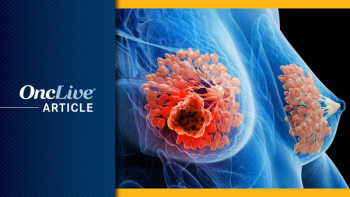
Future Directions for Liquid Biopsy in NSCLC
Transcript:
Sandip Patel, MD: I think liquid biopsy approaches, such as cell-free DNA for non—small cell lung cancer, are going to be increasingly accepted and utilized by oncologists to make treatment decisions for patients. As the technology and the detection capability continues to improve, the panels become larger and they become more sensitive. The ability to make treatment decisions based on liquid biopsy will continue to improve over time, and I think these will be used not only at the diagnostic level, when a patient is first diagnosed with cancer, but also for on-treatment resistance monitoring as well. And so, for these patients, I think the ability to have a liquid biopsy approach such that they don’t have to undergo repeat needle-based biopsies by interventional radiology would be a huge advantage in profiling a patient. And I think one day, technology will get to the point where we can not only assess patients who have resected cancer, stage 1 to stage 3, for early detection of recurrence, but also potentially find a role for these assays in cancer prevention—early detection of cancer polyps and lung nodules, such that we can intervene in a patient’s favor even before these can be detected by imaging.
And one future application of cell-free DNA in non—small cell lung cancer as detection capability improves is in patients who are undergoing low-dose CT screening, in terms of best assaying whether or not a patient may have a cancerous lesion versus a benign lesion, or in patients who undergo resection for early detection of relapse. One of the most exciting areas of liquid biopsy for me, especially as the technology continues to improve in terms of breadth and depth of cancer detection, is the ability to use these assays to predict tumor mutational burden, which will be helpful in immunotherapeutic treatment selection for our patients. Additionally, as these panels continue to broaden, the ability at diagnosis to get a single liquid biopsy to completely understand the complete tumor burden that a patient has, beyond just a biopsy of a single lesion, will be hugely important in terms of capturing tumor heterogeneity and sparing patients a biopsy.
Geoffrey R. Oxnard, MD: There are 2 directions that I want liquid biopsy to go in the future. The first is that I want to be able to order these tests, not just today at a decision point, but also in 3 weeks from now and in 6 weeks from now and in 3 months from now. I want to order them every time I see a patient, to help me know how their cancer is behaving. But if I’m going to do that, I need a result that is inexpensive and fast. But that would be great. We can order these again and again to help inform CAT scans and symptoms, and help us clarify how a patient is responding to therapy. I think liquid biopsies could play that role, but not necessarily today’s liquid biopsies. I think we need a new technology that’s faster and cheaper.
The second thing is that I think we could move these—and many are investigating this—from management of advanced cancer to management of early stage and resectable cancer. I see a patient with stage 3 lung cancer, I’ve given them chemoradiation, and it appears that the cancer has responded. But you know how that looks. The CAT scan’s messy and there’s a lot of scar tissue, so I send a liquid biopsy and it shows there’s still a KRAS mutation floating around. That probably is a bad sign. That probably means that patient is going to have a recurrence. And what I’d like to be able to do is escalate treatment at that point and maybe add another treatment—give more chemotherapy or add immune therapy.
And so, finding a way to integrate retesting to assess disease status and to assess for cancer that’s left over—there’s a lot of literature about how to do that with some emerging technologies, but not enough using clinical assays such that you or I could send this for our patients today. That’s coming. I think it’s a year or 2 away, but it’s going to be one of the next ways that we start using liquid biopsies in lung cancer, and perhaps across cancer types.
Transcript Edited for Clarity




































